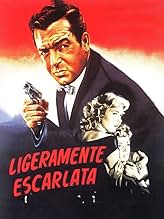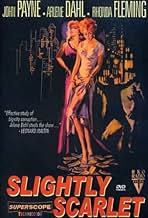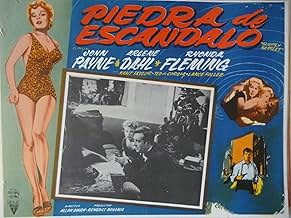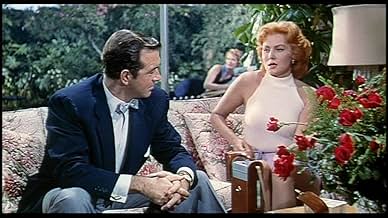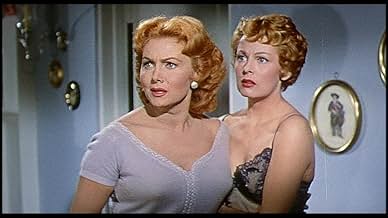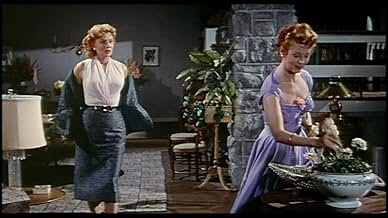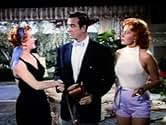IMDb RATING
6.5/10
1.4K
YOUR RATING
An urban wheeler-dealer gets involved in organized crime, corrupt city politics and graft while falling in love with the fiancée of the newly elected mayor.An urban wheeler-dealer gets involved in organized crime, corrupt city politics and graft while falling in love with the fiancée of the newly elected mayor.An urban wheeler-dealer gets involved in organized crime, corrupt city politics and graft while falling in love with the fiancée of the newly elected mayor.
Fred Aldrich
- Policeman
- (uncredited)
Murray Alper
- Hood
- (uncredited)
Albert Cavens
- Man at Campaign Headquarters
- (uncredited)
Ellen Corby
- Martha
- (uncredited)
Paul Cristo
- Man at Campaign Headquarters
- (uncredited)
Sam Flint
- Man at Campaign Headquarters
- (uncredited)
Curt Furberg
- Man at Campaign Headquarters
- (uncredited)
Rudy Germane
- Hood
- (uncredited)
Frank Gerstle
- Dave Dietz
- (uncredited)
Kenneth Gibson
- Man at Campaign Headquarters
- (uncredited)
Roy Gordon
- General Norman B. Marlowe
- (uncredited)
- Director
- Writers
- All cast & crew
- Production, box office & more at IMDbPro
Featured reviews
James M. Cain's first Hollywood fusillade went off in the mid-1940s, with Double Indemnity, Mildred Pierce and The Postman Always Rings Twice, all adapted from his books, helping to set the tone and the parameters for the noir cycle just getting up steam. In the mid-50s, he had a second wind, with Serenade and, from Love's Lovely Counterfeit, Allen Dwan's Slightly Scarlet. While not one of Cain's better works or one of the better movies made from them, it has its ample fascinations. Legendary noir director of photography John Alton works in color here, and startlingly enlivens his customary dark trapezoids with bursts of lime green, flame orange and orchid. (The rare films noirs done in color seem even more decadent: see Leave Her to Heaven and Desert Fury). John Payne reprises his solid, sullen self as a fence-straddling minor mobster who sees his chance to take control of the machine in a mid-sized midwestern city. His twin carrot-topped temptations are sisters Rhonda Fleming, as the mayor's gal Friday, and Arlene Dahl, who has just been released from prison -- she's a loony, man-devouring klepto (and Dahl does her proud. There's even a scene when Fleming finds the message "Goodbye Sister" scrawled in lipstick on her bedroom mirror). Too bad there was a lot of (unnecessary) rewriting of Cain's story; the ending is sourly ambiguous. But this is late noir in garish overdrive, and movies aren't much more fun than that.
Anyone remotely interested in cinematography and art direction should see this. John Alton, chiefly famous for his work in black and white, here switches to livid colour and achieves some of the most daring and moody effects ever known in colour films. This was a decade before 'flashing' the film became popular (a technique developed by Freddie Young, who told me all about it at the time he began the trend, with Lumet's 'Deadly Affair'). Everything here is so vivid, and the games played with colour in choice of sofas, walls, carpets, not to mention hair, are so intense, that the film is really chiefly of interest for all of that. Alton had to work only with variations in lighting, not with film processing possibilities. What he did is incredibly audacious, worth watching over and over just to study it. He has whole figures in shadow, and faces often are eclipsed by darkness in a bright room. It is really an incredibly dazzling display of virtuosity and genius. The two lead gals have matching hair, which plays well on the sets. Rhonda Fleming was a notorious strawberry blonde, and although I seem to recall that Arlene Dahl was really a normal blonde and presumably had her hair died to match Fleming's for this film, here they are very like the sisters they play indeed, with matching peachy hair and bright blue eyes. It is all a symphony of light and dark and colour combinations, like a modernist painting. The story is tepid, diluted from a James Cain novel about city corruption and crime. Arlene Dahl is not very convincing as a kleptomaniac siren who is supposed to be deeply psychologically disturbed (that part only comes out at the end, though we know about the thefts from the beginning, as the film begins with her coming out of prison). Rhonda Fleming swings her hefty bust around with confidence, and glares with her blue eyes at people as she challenges them, which with her fiery nature she does a lot. Into this mix comes a very seedy character played by John Payne, who by this time was really getting a little too old for such roles, nice fellow though he was. However, a sufficiently noirish tale ensues which is worth watching, though it is not a proper film noir, but merely has certain elements of that left, as the mid-1950s were asserting themselves, and people were getting more interested in Debbie Reynolds and Doris Day, and the War was a fading memory, and even the Korean War was passé by this time. Yes, things were changing, people were getting cheerier and more bourgeois by the minute, and gloom was no longer so popular, or must be relegated to horror films instead. Time to lighten up! So this is an interesting historical curiosity, a lingering shadow cast over the smiling face of a complacent Middle America which was just settling down to a nice long afternoon nap which would last until the sixties.
First, let's be straight: this is a deliriously entertaining, venal and vampy exercise in melodrama. It's a ridiculous movie with a nonsensical script, awesome crazy quilt radioactive light bright technicolor and at times laughably non-motivated behavior. But it's also a tongue-in-cheek anti-noir mini masterpiece crammed with over dramatized scene chewing and pleasingly unintentional laughs. The set designs feature some of the biggest house interiors ever (how does Rhonda Fleming afford that mansion on her secretarial salary??) Arlene Dahl is a deliciously cheesy home run as the sex object du jour and gives Martha "The Big Sleep" Vickers a run for her money in the slutty and criminally irredeemable little sister department. Everyone is working some angle here (particularly John Payne), which is both intriguing and finally just dizzying. Fleming, Dahl, Payne and Kent Taylor take a love triangle and turn it into a quadralateral with little trouble. This isn't the calculated and sleek Double Indemnity James M. Cain, but it sure has the smoulder and desperation of The Postman Always Ring Twice JMC.
There's a political campaign thrown in and a big gangster (huffy and puffy Ted De Corsia) subplot for good measure, but this is ultimately a celebration of the campiest aspects of melodrama and what a party they throw! Definitely a date movie and highly entertaining for all the right reasons. If you can see it in the theatre, you may go blind from the glowingly phosphorescent crimson hues. "Slightly" Scarlet my ass!
There's a political campaign thrown in and a big gangster (huffy and puffy Ted De Corsia) subplot for good measure, but this is ultimately a celebration of the campiest aspects of melodrama and what a party they throw! Definitely a date movie and highly entertaining for all the right reasons. If you can see it in the theatre, you may go blind from the glowingly phosphorescent crimson hues. "Slightly" Scarlet my ass!
This movie showed Rhonda Fleming in a subdued part as a secretary to a town politico. She's one of my favorite actresses from the 50's, and was one of the most beautiful ever to grace the screen. John Payne was lucky enough to have a couple romantic scenes with her.
Back in the 50's, kissing scenes were far more romantic and tantalizing than today. Wish I could have bottled Rhonda Fleming!
Back in the 50's, kissing scenes were far more romantic and tantalizing than today. Wish I could have bottled Rhonda Fleming!
The 1956 film "Slightly Scarlet" at first glance looking back from our sophisticated perspective today seems to be a bit of a tongue-in cheek joke.
Directed by Allan Dwan from a Robert Blees screenplay adapted from James M. Cain's novel "Love's Lovely Counterfeit", the 99-minute film is a great combination of color and art direction in a film noir.
Not a highly regarded film noir, in Technicolor and Superscope its palette utilizes a wide range of color to support the individual themes and characterizations.
Our main characters have color scheme that establish them and develop with the story.
Arlene Dahl as Dorothy wears black as she is released from prison and even sports a black bathing suit later in the film.
Rhonda Flemming as June initially appears in Spring-like colors of off-white and yellow, with colors matching her mood as the film progresses. She wears white and blues when she meets Ben Grace for the first time, then black and off-white when they kiss and she begins to fall in love with him. When Dorothy is arrested Rhonda wears a grey sweater and skirt but by the end of the film June wears the same black color as Dorothy emphasizing her relationship to her bad sister.
Although the pivotal action of the film rests on Ben Grace, it is through June that we understand the important elements of the story, and the value of good and bad in this noir world as well as our own.
A study in duality, it falls short by not delivering what it promises but only shifts the pivotal actions onto the male character in the film.
In more than one scene characters tell Ben Grace that he is taking advantage of the situations around him to unfair terms.
Police man Dietz (Frank Gerstle), who Grace gets put into a high-ranking position accuses Ben of playing both ends toward the middle.
A great line from Sole Caspar to Ben Grace sums up his character completely: "Genius you're just a chiseler out for a soft spot. You're not crooked and you're not straight. You take what you can get where you can get it but you don't want any trouble. You'll die at age 66 with three grand in the bank but you'll never be an operator." Looking back its moments of plot change create humor because of the style of acting and the overall writing in the script.
But there is still ample example of real noir elements despite the color of the film.
The title suggests the slightly scarlet is a pun on the pure heart of the lead female as measured against the overall 'sick' nature of her sister, the one who steals.
The quality of the motivation to steal of the second female lead as compared against the organized mob activities of the lead crook is an interesting one. There is the opportunity foe the woman to become the girlfriend of the mob boss, and she seems perfectly matched for the role.
Directed by Allan Dwan from a Robert Blees screenplay adapted from James M. Cain's novel "Love's Lovely Counterfeit", the 99-minute film is a great combination of color and art direction in a film noir.
Not a highly regarded film noir, in Technicolor and Superscope its palette utilizes a wide range of color to support the individual themes and characterizations.
Our main characters have color scheme that establish them and develop with the story.
Arlene Dahl as Dorothy wears black as she is released from prison and even sports a black bathing suit later in the film.
Rhonda Flemming as June initially appears in Spring-like colors of off-white and yellow, with colors matching her mood as the film progresses. She wears white and blues when she meets Ben Grace for the first time, then black and off-white when they kiss and she begins to fall in love with him. When Dorothy is arrested Rhonda wears a grey sweater and skirt but by the end of the film June wears the same black color as Dorothy emphasizing her relationship to her bad sister.
Although the pivotal action of the film rests on Ben Grace, it is through June that we understand the important elements of the story, and the value of good and bad in this noir world as well as our own.
A study in duality, it falls short by not delivering what it promises but only shifts the pivotal actions onto the male character in the film.
In more than one scene characters tell Ben Grace that he is taking advantage of the situations around him to unfair terms.
Police man Dietz (Frank Gerstle), who Grace gets put into a high-ranking position accuses Ben of playing both ends toward the middle.
A great line from Sole Caspar to Ben Grace sums up his character completely: "Genius you're just a chiseler out for a soft spot. You're not crooked and you're not straight. You take what you can get where you can get it but you don't want any trouble. You'll die at age 66 with three grand in the bank but you'll never be an operator." Looking back its moments of plot change create humor because of the style of acting and the overall writing in the script.
But there is still ample example of real noir elements despite the color of the film.
The title suggests the slightly scarlet is a pun on the pure heart of the lead female as measured against the overall 'sick' nature of her sister, the one who steals.
The quality of the motivation to steal of the second female lead as compared against the organized mob activities of the lead crook is an interesting one. There is the opportunity foe the woman to become the girlfriend of the mob boss, and she seems perfectly matched for the role.
Did you know
- TriviaArlene Dahl offered to play cards with Rhonda Fleming to determine who would be the first on the poster. Dahl won the game, and in return demanded that Fleming be the first in the credits of the film. Fleming was very touched by this gesture and the two actresses became good friends.
- GoofsVery early in the film, just after Dorothy Lyons has been released from prison, Ben Grace is in police Lt. Dietz's office discussing her. The lieutenant is perusing Miss Lyons' criminal file which the viewer can briefly view. At the top of the document a spelling error displays her name as "Dorthy Lyons".
- Quotes
Solly Caspar: Let's see if we can beat him down.
[after throwing a body out of an upper story window]
- ConnectionsFeatured in Saving Cain: Robert Blees on 'Slightly Scarlet' (2009)
- SoundtracksFor He's A Jolly Good Fellow
(uncredited)
Traditional
Heard at the announcement of the election results
- How long is Slightly Scarlet?Powered by Alexa
Details
- Release date
- Country of origin
- Official sites
- Language
- Also known as
- Slightly Scarlet
- Filming locations
- Production companies
- See more company credits at IMDbPro
- Runtime1 hour 39 minutes
- Aspect ratio
- 2.00 : 1
Contribute to this page
Suggest an edit or add missing content

Top Gap
By what name was Deux rouquines dans la bagarre (1956) officially released in India in English?
Answer


